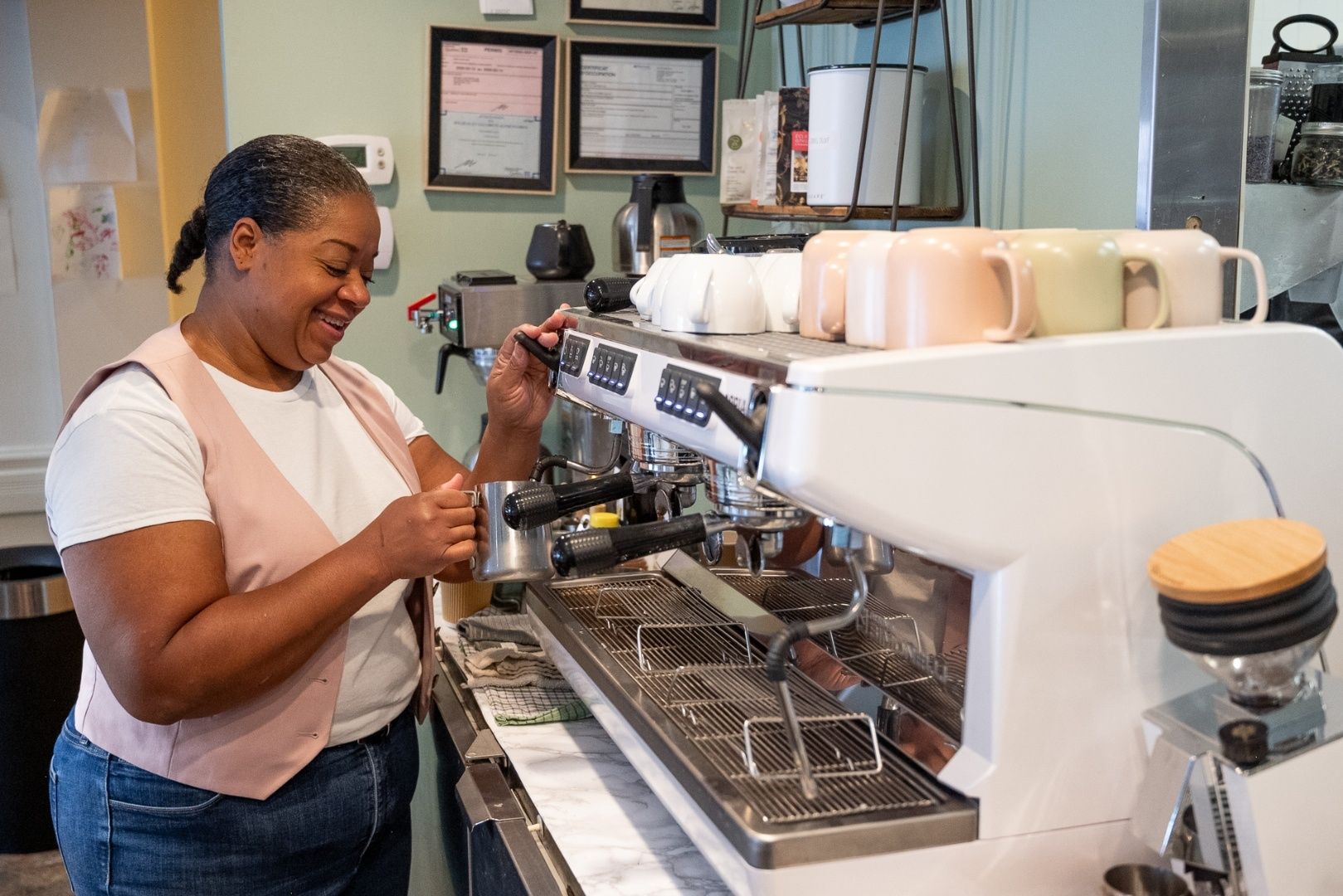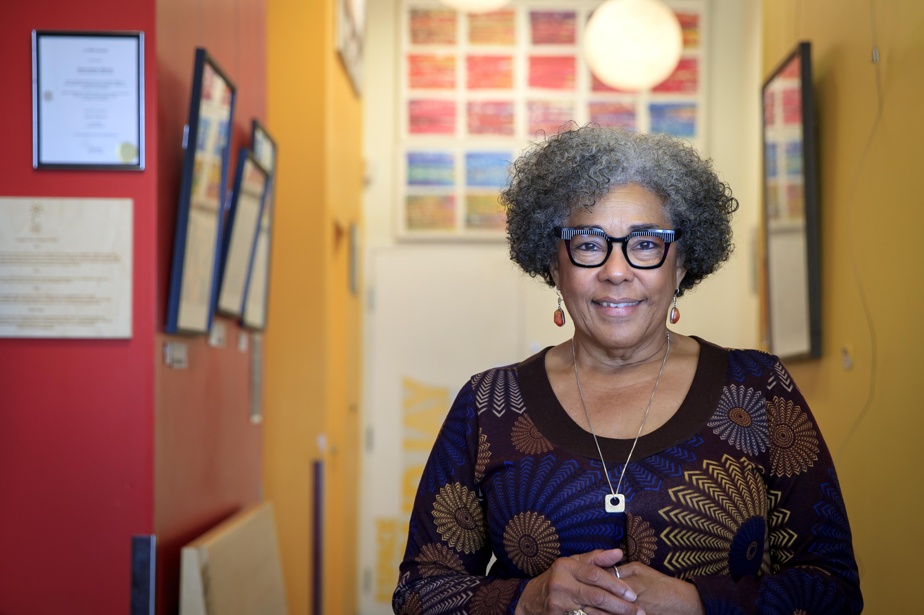While the Montreal hip hop scene has continued to develop over the years, the place of women in this field has only begun to take on a certain scale in the last decade or so. Pioneers of local and national rap have been able to pave the way for emerging artists like SteinZ or Guessmi but, according to the main stakeholders, there is still a lot to do.
Being a rapper in a man's world, the story of Guessmi
If you cross one of the bridges in the north of Montreal, you land in Laval, a city that is disappearing from the postcards. A municipality that sometimes concentrates the same social inequalities as Montréal-Nord: more unemployment than the provincial average and more precariousness, in particular. The Laval hip hop scene is therefore often associated with that of the neighboring city, with some artists depicting similar issues.
Guessmi is a young rapper from Laval of Tunisian origin. Aged 23, she was born and raised in Quebec. Having attended a Muslim school for most of her schooling, she claims “not to have been mixed with the others (cultures) in Montreal.” It is therefore since she entered adulthood that she has been immersed in the Montreal melting pot.
Make music to make the wind turn
For Guessmi, it's obvious: for as long as she can remember, singing and rapping have made her feel better. “At the beginning, I wrote texts in my room. It was very personal. I didn't let anyone see them, not even my friends; I was too embarrassed, she recalls, smiling timidly. Then, one day, I found myself in a recording studio by chance, accompanying a friend. I picked up a microphone and tried it. I was surprised by the result; when I went home I knew I had to do something with it.”
The texts of the Laval artist deal a lot with her personal experiences. “For me, my music is like a way of telling myself that, even when things go wrong, life goes on and the tide is changing,” she summarizes.
The separation of her parents when she was very young and the adjustment to a single-parent family life marked her. So writing became more than a hobby for Guessmi; it became a necessity.
“Sometimes people don't take me seriously”
“When you are a woman in a man's world, you have a difficult daily life”, begins the artist. With her brows furrowed, she takes time to think, seems to evoke certain memories, and then continues. “Every day is a fight. I know I shouldn't be victimizing myself or focusing on that, but that's the reality.” In a male-dominated arena, being a rapper is a big challenge, but—she clarifies—never to the point of making her question her career. “I don't want to be associated with something I'm not. I simply want to have a place that is respected, just as if I were a man, because if I were a man, I know that I would not face the same reality”, she continues, before specifying: “When I propose ideas, when I ask for advice, when I ask for advice, when I even speak, sometimes I am not taken seriously.”
Guessmi doesn't mince words to denounce the sexism that plagues the profession. “It's not limited to artists. There are almost no women in the industry at all. Videographers, producers, press relations workers, photographers, journalists, etc. When I meet a woman in the same industry as me, I automatically tell myself that we need to stick together, because we are experiencing the same negative realities,” she adds.
Rape culture
As a hip hop artist, Guessmi is concerned about the importance of rape culture in her industry. “There has been so much normalization of sexist and problematic lyrics in hip hop. It's everywhere, she exclaims. Since it is mainly men who participate in the production of these pieces, it is easy to trivialize a reality that they do not suffer from.” Visibly frustrated, she rolls her eyes before continuing: “I even see women trivializing words that degrade women and do not respect them. I don't understand It's so soaked up in our heads, and it's very serious. Young people will grow up surrounded by this kind of message and will not see the problem when a sexist incident, or worse, happens in front of them. If comments like this are considered normal, then we should not be surprised at all the problems that this causes,” she protests.
From a more positive perspective, the rapper says that this phenomenon is being taken more and more seriously. As an example, she cites a piece by the French rapper Tayc: When you sleep. Accused of wanting to make a non-consensual sexual relationship romantic, he was removed from listening platforms last spring. “Mentalities are changing, the world of music is evolving. It is still not what we would like it to be, but it is improving, it is better than nothing”, she rejoices.
For her, one of the solutions to sexism in rap is to give back to her community. “If I know that one person listens to me and feels better, it's more important than if a thousand others listened to me but didn't feel anything. I know how hard it is to be a young person in and around Montreal, even more so if you are a woman — and even more so if you are racialized. I want young people to see me to see hope and to have fun playing my music! ” concludes the artist, a smile back on his lips.
Rap to express yourself, the case of SteinZ
Coming from the Saint-Laurent neighborhood, SteinZ was born to Haitian and Gambian parents. Gradually making her way into the Montreal hip hop industry, this sci-fi and horror fan takes her stage name from Frankenstein, author R.L. Stine and Albert Einstein, a personality she is fascinated by.
Rap as a personal purgatory
SteinZ got into the rap world so that a large audience could recognize themselves in her story. “I was always looking for a more 'official' way to express myself, to share my life in a way that could have an impact,” she describes.
Her influences are mainly two American female rappers. “First of all Doja Cat, because she allowed me to discover the alternative genre of rap that I do. He is an idol for me. You can even hear a bit of Doja Cat in my style,” she explains with a smile on her face. “She inspired me a lot. Listening to him, I asked myself if I could do something similar. She kept her authenticity, even if many criticized her.” Another idol: “Nicki Minaj, a pioneer in female rap, of course. She is one of the first of our generation who knew how to sit at the same table as other male rappers.” According to her, the latter influenced her “unconsciously”, because she has listened to him since a young age and has soaked up his musical presence.
On a more personal note, the young rapper believes that her surroundings are also one of her great sources of inspiration. “For a long time, I have followed a simple approach: “Always surround myself with people who have a talent similar to mine and who are successful.” It's a thought that may seem a bit negative, but I've learned that this is how you motivate yourself to reach your destination.” SteinZ tamed this maxim by attending the NBS Studio (NotBadSound). It was in this community space that she was able to get a foothold in the Montreal music industry, and where she met her mentor, Jai Nitai. At the studio where she was born in a way, she says that this expression makes perfect sense.
Life is a card game
“A problem that is close to my heart is that of broken families. Especially families that suffer from the absence of the father,” she begins. “If you see the statistics, families where the father is absent make up about 25% of the white population. For Hispanic families, this figure rises to 50.52%. And then, for black families, it reaches 72%” *, she explains. “It's absolutely ridiculous. Of course, there are historical factors that play an important role in all of this,” she continues.
With rap as an outlet, she hopes, she says, “to break this toxic cycle.” To change things, SteinZ believes that “not to despair and to keep moving, even if times seem hard” contributes to coping with the consequences of single parenthood. “The way I see the world is like a game of cards. Even though I have the worst cards in my hands, the game is not over. It's over when I Decide, and I'm not going to give up. There is always a way to play your cards well and that's what I want to do.”
“Writing and rapping is a form of resistance”, concludes the artist.
SteinZ and Guessmi's stories differ when it comes to the issues that affect them. However, they are united in their desire to progressively revolutionize their industry. While the personal problems of these two women are at the heart of their writings in their performances, it is, in both cases, a form of resistance.
*The Figures about single-parent families are almost similar in the United States, according to the Annie E. Casey Foundation.





.jpg)
%20(1).webp)

.jpg)

